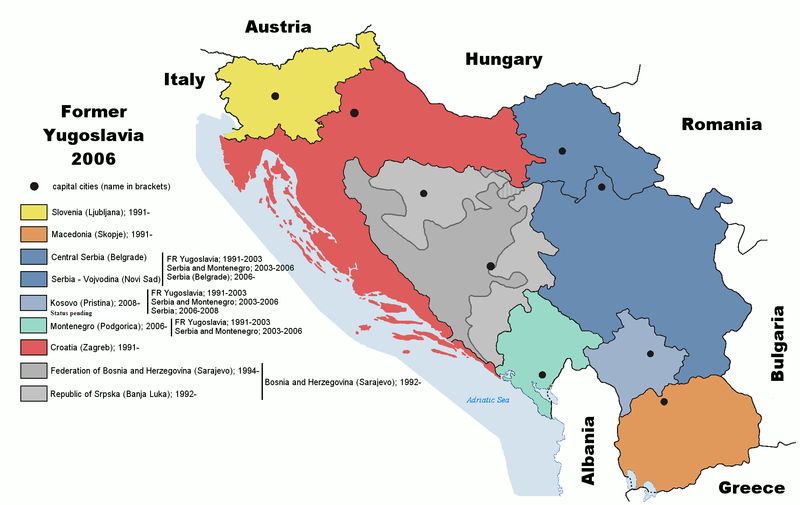 Map of former Yugoslavia with division of Bosnia-Herzegovina. June 2006 Author: Paweł Goleniowski (swPawel)see Wikipedia Yugoslavia for full size version.
Map of former Yugoslavia with division of Bosnia-Herzegovina. June 2006 Author: Paweł Goleniowski (swPawel)see Wikipedia Yugoslavia for full size version.For instance, the Yugoslavian war that split the country into parts was not only a cultural war, but also a religious war. Mark Silk in Religion in the News, Spring 2000, said of the conflict, “The aim of restoring Orthodoxy to its "rightful" place at the center of Serbian self-assertiveness may seem like an abuse of what we think of as Christian ideals, but that doesn’t make it hypocritical or nonreligious. Had NATO policymakers taken more seriously the religious significance of Kosovo for Serbian national identity, they would not have so badly miscalculated what it would take to persuade Milosevic to withdraw his troops. It is not irrelevant that Serbian religious practice now seems to be undergoing a revival.”
He goes on to say, “Religion is a moving target, even within a given country. As circumstances change, it can come to the fore or retreat into the shadows as a political actor. Whether the conflict is taking place in Ireland, Chechnya, Nigeria, Burundi, Iran, Afghanistan, Kashmir, or Sri Lanka, we cannot afford to be dogmatic about the role religion plays. Its measure must be taken case by case.”
The current conflicts within the Anglican Communion and its various national churches are religious conflicts that have been escalating into wars in recent months. What else can we call Nigeria’s attempt to enact a death penalty for homosexuals? This legislation was endorsed by the highest Anglican official of that country, Archbishop Akinola, and his actions put much of the rest of the Anglican Communion in conflict with that country and that church. A religious conflict.
 photo of Bishop Minns and Archbishop Akinola by The Christian Post
photo of Bishop Minns and Archbishop Akinola by The Christian PostAnd, now Archbishop Akinola has invaded the Episcopal Church in the United States over morality and Biblical interpretation issues. He has ignored the documents of Dar Es Salaam; he has ignored the due process he once endorsed; and he has planted his own church in place of The Episcopal Church, a major blow to reconciliation with the Anglican Communion.
Possibly the only reason that this conflict has not degraded into actual warfare is that the United States is much more powerful than Nigeria and thus not susceptible to invasion should the Archbishop set his mind to rescuing the entirety of Episcopal churches or even the entirety of Protestantism. In other places and other years, very violent wars have been fought over lesser provocation.
 King Charles I
King Charles IFor instance, the Civil Wars in Great Britain began when Charles I tried to impose the Anglican Prayer Book on the Scottish Church. From our perspective we can see that Charles was doomed to failure for the Scottish nobles and clergy signed a National Covenant in 1638 to defend their church against Anglicanism and Episcopalianism. The conflict escalated into war and later involved Ireland – not just on religious issues but also political and societal issues. The Thirty Years Wars ended with legislation in 1689-1701 that specified the relationship of the monarchy to the parliament, the rights of both, and the fact that the monarch must be a communicating member of the Anglican Church.
In other parts of the world, wars are being waged in the name of religion for lesser offences than accepting homosexuals into full communion in the church or the ordaining of women. Bonnie Erbe, writing for Scripps Howard News Service said, “Right now, we only need look at the Middle East for confirmation of the fact that religious differences spark violent conflict. In Iraq, Sunni and Shiite Muslims murder each other for political gain. Palestinians are several years into a bloody intifada against Israelis who, according to each side's religious texts, spring from the same ancestors.”
Just as emotional violence done to vulnerable people can exact consequences as serious as physical violence, so the emotional and spiritual “wars” of the Anglican Communion are exacting their disastrous results on people all over the world, most especially the vulnerable women and homosexuals.
The common people in most countries follow their leaders, and Archbishop Akinola’s followers will undoubtedly follow him, along with lesser bishops in his area. The Archbishop of Canterbury’s leadership has failed with the installation of Bishop Minns in Virginia. I don’t know how the common people of other countries will react to this invasion and this religious conflict. The people of the Episcopal Church in the United States have tried to act in a reconciliatory way, a via media way, and that has failed to impress the leadership of purportedly Anglican churches who disagree dogmatically. Where will the Anglican Communion go next? Who will be killed in the name of religion? Where will the Episcopal Church stand?





2 comments:
Thanks for a strong and sobering piece. It always puzzles me how we humans get from worship to violence so quickly.
Powerful post, Sharer Cropper. Thank you for enlightening me on much about this conflict.
Pax, C.
Post a Comment